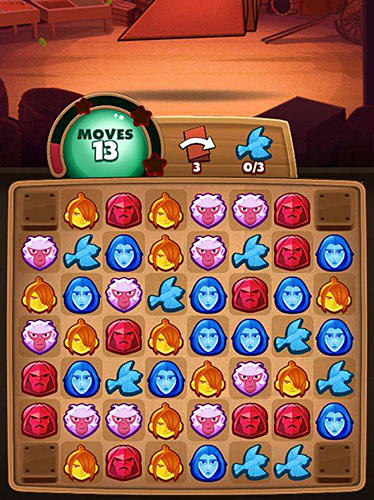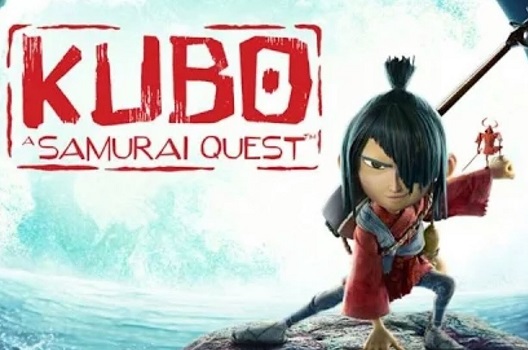I’ll be the first to admit that I judge most games with movie tie-ins before I even play them. That goes double for mobile games. Let’s face it, they have a very poor reputation. Nevertheless, I am always willing to try new games and give them a fair chance.
Kubo: A Samurai Quest was developed by Fifth Journey Limited. They’re an independent studio based in Hong Kong and focus on ‘Hollywood Games’. Their website has the following statement:
Fifth Journey develops next-generation Hollywood games and mobile entertainment.
From feature animations to cult classics and blockbuster franchises, Fifth Journey is pioneering mobile entertainment in partnership with the world’s leading studios.
Okay, that’s not a bad thing. The studio is also comprised of some veteran developers with resumes that include positions at Lucasarts and 2k. Another plus for them.
Kubo: A Samurai Quest is based on the LAIKA movie, Kubo and the Two Strings. LAIKA is an animation studio owned by NIKE co-founder Phil Knight and is known for specializing in stop-motion animation. They’ve made such films as; ParaNorman, The Boxtrolls, Coraline, along with Kubo and the Two Strings. All are highly praised, having received Oscar nominations, with Kubo being the most well received of all.
 One thing that’s most notable about the LAIKA movies, is that they look amazing. Kubo: A Samurai Quest does a good job of bringing that beauty to a mobile game. The characters and creatures look like the models in the film, and the backgrounds are interesting. Most games in the tile-matching puzzle genre that I’ve played can look rather boring. This game looks like it’s made from origami, and it looks authentic for the most part. The only thing I didn’t like about the visuals were the design of the actual tiles. The character heads don’t seem to fit the origami style.
One thing that’s most notable about the LAIKA movies, is that they look amazing. Kubo: A Samurai Quest does a good job of bringing that beauty to a mobile game. The characters and creatures look like the models in the film, and the backgrounds are interesting. Most games in the tile-matching puzzle genre that I’ve played can look rather boring. This game looks like it’s made from origami, and it looks authentic for the most part. The only thing I didn’t like about the visuals were the design of the actual tiles. The character heads don’t seem to fit the origami style.

Music is also important to a game, and this one has music that I actually want to listen to. For a lot of the levels, you’ll see Kubo at the top of the screen playing his shamisen. I played the game on a low-budget Android phone, and it sounded good. I lot of times when I play mobile games I turn off the sounds altogether. So kudos for Kubo.
Now for the actual gameplay, Kubo: A Samurai Quest is one of the best tile-matching puzzle games I’ve played on a mobile device. The game has an actual story that doesn’t follow the plot of the movie. Sure, it’s not exactly a sequel or prequel, but it’s engaging nonetheless. After a tutorial stage, you play through some fairly genre-standard levels, with time-limits and matching goals. It’s when you get to battle origami creatures that it gets better. Again, the art style helps this game a lot. You’ll go through levels in which you “fold” the origami creatures. For most battles, you can select up to three creatures to have in your party, and they can also be leveled up by obtaining duplicates found in boxes you earn. 
The battle system is element based, with five elements; Fire, Water, Nature, Light and Dark. Fire beats Nature, Water beats Fire, and so on. Battle levels also have different tiles, and you’ll alternate turns with an opponent. Matching sword tiles will attack, heart tiles will heal you, and energy tiles charge a super attack. This adds a level of strategy not found in similar titles.
Each chapter has variety of level types including music, storytelling, origami folding, and the battles I mentioned. Throughout each chapter there are mini-bosses and a final boss at the end. Completing each level will reward you with a pouch or a box that can contain origami creatures, coins, and gems. The higher your score, the better loot you get.
As with most mobile games, this is a freemium game. Meaning it’s free to download and play, but you have the option to spend real money. That’s not really a detriment to the game. Most console games have in-game transactions, too. Kubo: A Samurai Quest does a pretty good job of not “gating” you with stamina or waiting for something to recharge to continue. Yes, there are things that have timers, and allow you to use your gems or coins to speed up the process, but it doesn’t get in the way.
After playing this game for several hours, I can confidently say that I recommend it. It’s accessible for gamers of all ages. The art style and music are engaging, and the variety of levels along with the origami creature collecting is addicting. With regular updates, there’s more to play and experience. I even want to watch the movie it’s based on after playing it. I’m also curious to see how this game would as a full HD console game.
Fifth Journey Limited has provided some hope for licensed games. I look forward to their next release.








Published: Nov 5, 2016 06:45 pm